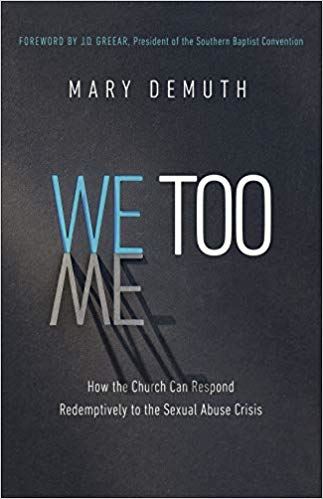13 Critical Reasons Abuse Survivors Are Leaving the Church

According to a recent Lifeway study, 10 percent of church attenders below age 35 have left a church because sexual abuse was not taken seriously. As we face the very real crisis of sexual abuse in our midst, it’s critical we understand how churches repel those who are hurting.
Here are 13 reasons I believe why abuse survivors are leaving the church:
1. We worry about false allegations.
Because the gospel holds grace at its core, church leadership tends to quickly believe the best about those who may appear to repent from grievous sexual crimes. Yet they are overly cautious to believe a victim’s report even though FBI stats show that false reports make up less than 5.4 percent of reported rapes. When in doubt, err on the side of belief.
2. We worship a happy world.
We compartmentalize our lives into sacred and secular spaces. In our secular framework, we “allow” for sexual misconduct. But because we so desperately want our churches to be safe, we close our ears to the cries of those harmed because they mar our longing for a happy world.
The world seems too unsafe if our church harbors sexual misconduct. We jump to believe the perpetrator and desperately want to silence the one who ruins our happy world.
3. We are naïve about predators.
The church has typically shown a gross naïveté in its understanding of predators. The truth is:
- They seem like us.
- They tend to be charming and friendly.
It seems easier to rationalize that “So-and-So,” the upstanding citizen, couldn’t possibly have criminal leanings than to believe a victim.
4. We don’t differentiate between sex and abuse.
Because sex is a difficult, nuanced topic, we refrain from talking about it openly, including issues of consent. One survivor laments, “There’s no discussion about the difference between abuse and consensual sex.”
Another shared, “A Christian counselor at my church, whom I saw for my PTSD, asked me if calling it ‘assault’ absolved me of guilt; that my rapist was simply incapable of stopping himself because he was a man (unlike me, who, as a woman, was capable of saying no to sex and should have stopped him).”
We must remember that consensual sex is not the same as sexual assault.
5. The Church prioritizes reputation over doing what is right.
One survivor shared that a church leader told her, “Don’t report your brother’s abuse. You’ll ruin the calling God has on his life.”
The leader was more interested in the brother’s reputation than justice. We also see this in the myriad of recent sex abuse scandals in the church. It follows a sadly predictable pattern:
Abuse - A cry of abuse is made by one or many.
Denial - Church leadership presents this to the person in question, who then flatly denies it, calling it lies.
Protection - Hoping to protect the reputation of the institution, the leadership publicly maligns the survivors and stands by the perpetrator, characterizing those who reported the abuse as agents of evil whose aim is to discredit the church.
Proof - More people come forward with accusations until their sheer weight solidifies the veracity of the first people’s claims.
Apology - The leadership (finally) issues a statement of apology after letting the perpetrator go.
Damage - Those who made the outcry in the first place are left to deal with the public damage and lack of initial belief.
Consequences - The church’s reputation is damaged anyway, and worse than anticipated.
6. We are naïve about trauma.
Because we don’t understand the nature of trauma, we tend to throw Christian platitudes and verses to the broken. We tell people,
- “That was so long ago, just get over it.”
- “The old is gone, the new is come, so if you’re dwelling on the past, you don’t have faith.”
- “God, after all, will work it all out for good.”
None of these pat answers dignify the very real pain of an abuse victim, and offer a superficial Band-Aid to a festering internal wound.
Many pastors have little to no training about how to deal with the traumatized. They are not counselors, and they carry a heavy load of caring for a group of broken people. They may feel ill-equipped or overwhelmed when someone discloses abuse.
7. We misplace shame.
Sexual abuse thrives in darkness, and shame often permeates the hearts of those who have been abused. One woman wrote that she always thought, “that if anyone found out I had been molested I would be an outcast. Even coming back into the church two decades later, I still believed no one would understand, especially when asked questions like ‘Why didn’t you say something?’”
Shame should belong to the one who perpetrated, not to the one he/she harmed.
8. We never talk about it from the front of the church.
In nearly four decades, I can count on one hand the number of times a story like mine (I was raped by teenaged boys as a kindergartener) has been shared from the pulpit. Even though I knew the sexual assault stats, I felt utterly alone.
We need to create language around abuse.
We need to hear real stories of people who have endured trauma.
Otherwise, we will look outside the church to find solace and companionship.
9. We don’t call sexual assault a crime.
A man in his thirties in pastoral leadership does not have a “consensual affair” or “inappropriate relationship” with a 16-year-old. To couch it in that language is to misunderstand the criminal justice system and to minimize a crime.
Sexual assault is a crime.
In addition, because it is a crime, it cannot be rightly handled in a church. If someone was mugged in front of a church and then ran into the building asking for help, the pastor would be a fool to only pray for the victim without first calling the police and an ambulance.
10. We are naïve about the healing journey.
It’s a decades-long process to work through trauma, but so few want to acknowledge this. One survivor aptly said:
“The church doesn’t really know how to support [survivors]. They usually take the ‘take two scriptures and please don’t call me about this in the morning’ response. Nothing says it’s okay to leave a church community like having members of your spiritual family look away from your broken, bleeding life.”
What if we reframed the healing journey? What if we simply called it discipleship? To walk alongside someone through their wounds and victories becomes the work of the church. In that model, we don’t see people as projects, but as image-bearers of the One who died for them.
11. We elevate forgiveness over justice.
There have been stories of pastors bringing the abuser and the abused into a meeting for the sake of reconciliation. The perpetrator, who is great at playacting remorse, “apologizes,” prompting the pastor to tell the victim to forgive in that moment or be faced with becoming bitter or in sin.
One survivor perfectly captured this scenario: “Churches want to offer forgiveness to perpetrators without justice, and expect silence from survivors without justice.”
12. We are too busy.
Many survivors share that once they disclose their abuse, they become ostracized by leadership because of their perceived neediness.
People who used to be supportive friends suddenly move away from relationship. Part of that may be due to a lack of training in how to respond redemptively, but their response could also be chalked up to overly scheduled and stressful lives.
We simply have no margin for those who have ongoing suffering, nor does the church know how to grieve alongside those who are hurting. Grief and trauma are long-term commitments, but we have become accustomed to short-term easy solutions.
13. We push away the reformers.
Instead of seeing abuse survivors as tutors leading us toward becoming compassionate representatives of Jesus, we repel them. They are the ones who understand the dynamic of our weakness married to Christ’s strength (see 2 Corinthians 12:9-10), but we would rather silence their voices and pretend that all is well.
We forget that they are deeply valuable to the life of the growing church.
As one who loves the church, I grieve that she has pushed away those who are hurting. I pray that we will look at ourselves and our systems honestly, humbly choosing to repent of our lack of response to the broken. I believe revival comes on the cusp of such a necessary repentance.

Photo Credit: ©GettyImages/tommaso79
Originally published August 15, 2019.




